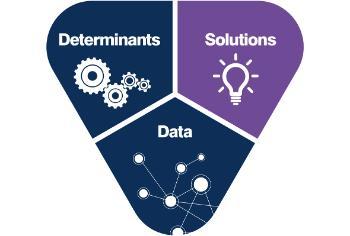Solutions focused research
Improving mental health
Our world-leading research in mental health aims to understand the determinants of mental health with a view to improving the health and wellbeing of all and reducing health inequalities.
Main contact
Prof Katie Robb (Mental Health and Wellbeing)
School of Health and Wellbeing research theme
Related University of Glasgow beacon
The challenge
It is estimated that more than 1 billion people globally are affected by mental health or substance misuse problems. While worldwide mortality rates from other causes of death have declined, premature mortality among those with mental health problems from suicide and comorbidities, has remained high. Inequalities are stark, with those from more socially disadvantaged backgrounds being most affected. One of the major challenges to prevention is the treatment gap, where there is a huge disparity between the number of people who need care and those who receive it. We need coordinated action to develop novel, scalable, accessible and effective interventions to tackle the global burden of mental health problems.
The research
Our research is organised around five specialist groups:
- The University of Glasgow Centre for Excellence in Developmental Disabilities aims to reduce the health and social inequalities experienced by people with developmental disabilities;
- The Suicidal Behaviour Research Laboratory has a worldwide reputation for conducting ground-breaking theoretically grounded basic science and interventions-based research in suicide prevention;
- The Psychosis Research Group has a distinguished track record in the development of complex psychosocial interventions for those living with psychosis.
- The Adverse Childhood Experiences Centre conducts world-leading aetiological and intervention research on the psychiatric and developmental problems of maltreated children;
- Our globally renowned Neuropsychological Rehabilitation Research Group focuses on the application of new technology in cognitive rehabilitation and the treatment of mood disorder in the context of brain injury.
The results
Our research has developed and evaluated a range of new psychosocial interventions for common and complex mental health problems, with trials of complex, face-to-face as well as digitally delivered interventions in adult mental health and suicidal behaviour, disability and in parent-infant mental health. These trials are underpinned by a programme of work aimed at the specification, measurement and validation of psychological, interpersonal and biological mechanisms of change. Further details can be found in our publications below.
The impact
Our research has made significant impact locally, nationally and globally on the delivery of mental health care. Our work on psychosis, brain injury, children, people in distress, suicide prevention and supporting people with developmental disabilities has influenced policy and clinical practice nationally and internationally.
The team
- Prof Jonathan Evans (Mental Health and Wellbeing)
- Prof Andrew Gumley (Mental Health and Wellbeing)
- Prof Andrew Jahoda (Mental Health and Wellbeing)
- Prof Craig Melville (Mental Health and Wellbeing)
- Prof Helen Minnis (Mental Health and Wellbeing)
- Prof Rory O’Connor (Mental Health and Wellbeing)
Related publications
Glasgow University Centre for Excellence in Developmental Disabilities
- Harris, L., Hankey, C., Jones, N., Murray, H., Pert, C., Tobin, J., Boyle, S., Shearer, R. and Melville, C.A. (2019) Process evaluation of a cluster-randomised controlled trial of multi-component weight management programme in adults with intellectual disabilities and obesity. Journal of Intellectual Disability Research, 63(1), pp. 49-63.
- Harris, L., Hankey, C., Jones, N., Pert, C., Murray, H., Tobin, J., Boyle, S. and Melville, C. (2017) A cluster randomised control trial of a multi-component weight management programme for adults with intellectual disabilities and obesity. British Journal of Nutrition, 118(3), pp. 229-240.
- Jahoda, A., Hastings, R., Hatton, C., Cooper, S. A., Dagnan, D., Zhang, R., ... & Scott, K. (2017). Comparison of behavioural activation with guided self-help for treatment of depression in adults with intellectual disabilities: a randomised controlled trial. The Lancet Psychiatry, 4(12), 909-919.
- Jahoda, A., Hastings, R., Hatton, C., Cooper, S. A., McMeekin, N., Dagnan, D., ... & McConnachie, A. (2018). Behavioural activation versus guided self-help for depression in adults with learning disabilities: the BeatIt RCT. Health Technology Assessment, 22(53).
Suicidal Behaviour Research Lab
- O’Connor, R.C., Ferguson, E., Scott, F., Smyth, R., McDaid, D., Park, A., Beautrais, A., & Armitage, C.J. (2017). A randomised controlled trial of a brief psychological intervention to reduce repetition of self-harm in patients admitted to hospital following a suicide attempt. Lancet Psychiatry, Jun;4(6):451-460.
- O’Connor, R.C., Lundy, J-M., Stewart, C., Smillie, S., McClelland, H., Syrett, S., Gavigan, M., McConnachie, A., Smith, M., Smith, D.J., Brown, G., Stanley B., & Simpson, S.A. (2019). Study Protocol for the SAFETEL randomised controlled feasibility trial of a Safety Planning Intervention with Follow-up Telephone Contact to Reduce Suicidal Behaviour. BMJ Open. 9 (2).
Psychosis Research Group
- Freeman, D. et al. (2017) The effects of improving sleep on mental health (OASIS): a randomised controlled trial with mediation analysis. Lancet Psychiatry, 4(10), pp. 749-758
- Garety, P. et al. (2021) Optimising AVATAR therapy for people who hear distressing voices: study protocol for the AVATAR2 multi-centre randomised controlled trial. Trials, 22(1), 366.
- Gumley, A. et al. (2020) Early signs monitoring to prevent relapse in psychosis and promote well-being, engagement, and recovery: protocol for a feasibility cluster randomized controlled trial harnessing mobile phone technology blended with peer support. JMIR Research Protocols, 9(1), e15058.
- Gumley, A. et al. (2017) A parallel group randomised open blinded evaluation of Acceptance and Commitment Therapy for depression after psychosis: pilot trial outcomes (ADAPT). Schizophrenia Research, 183, pp. 143-150.
Adverse Childhood Experience Centre
- Crawford, K. et al. (2022) The Best Services Trial (BeST?): a cluster randomised controlled trial comparing the clinical and cost-effectiveness of New Orleans Intervention Model with Services as Usual (SAU) for infants and young children entering care. Trials, 23, 122
- Kainth, G., Turner, F., Crawford, K., Watson, N. , Dundas, R. and Minnis, H. (2022) Process evaluation protocol for the (BeST?) Services trial. Developmental Child Welfare, 4(1), pp. 56-72.
Neuropsychological Rehabilitation Research Group
- Baylan, S. et al. (2020) Measuring the Effects of Listening for Leisure on Outcome after stroke (MELLO): a pilot randomised controlled trial of mindful music listening. International Journal of Stroke, 15(2), pp. 149-158.
- Gracey, F., Fish, J. E. , Greenfield, E., Bateman, A., Malley, D., Hardy, G., Ingham, J., Evans, J. J. and Manly, T. (2017) A randomized controlled trial of assisted intention monitoring for the rehabilitation of executive impairments following acquired brain injury. Neurorehabilitation and Neural Repair, 31(4), pp. 323-333.
- Cullen, B., Pownall, J., Cummings, J., Baylan, S., Broomfield, N.,Haig, C., Kersel, D., Murray, H., and Evans, J. J. (2016) Positive psychotherapy in ABI rehab (PoPsTAR): a pilot randomised controlled trial. Neuropsychological Rehabilitation.



